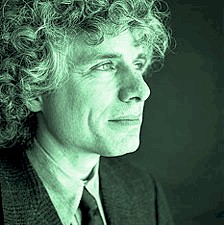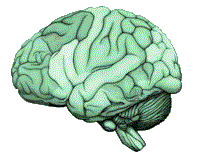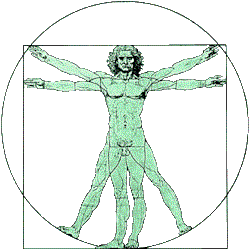
A Blank Slate?
In his book, "The Blank Slate" Harvard Professor Steven Pinker writes:
The starting point for acknowledging human nature is a sheer awe and humility in the face of the staggering complexity of its source, the brain. Organized by the three billion bases of our genome and shaped by hundreds of millions of years of evolution, the brain is a network of unimaginable intricacy: a hundred billion neurons linked by a hundred trillion connections, woven into a convoluted three-dimensional architecture. Humbling, too, is the complexity of what it does. Even the mundane talents we share with other primates—walking, grasping, recognizing—are solutions to engineering problems at or beyond the cutting edge of artificial intelligence. The talents that are human birthrights—speaking and understanding, using common sense, teaching children, inferring other people's motives—will probably not be duplicated by machines in our lifetime, if ever. All this should serve as a counterweight to the image of the mind as formless raw material and to people as insignificant atoms making up the complex being we call "society."
The human brain equips us to thrive in a world of objects, living things, and other people. Those entities have a large impact on our well-being, and one would expect the brain to be well suited to detecting them and their powers. Failing to recognize a steep precipice or a hungry panther or a jealous spouse can have significant negative consequences for biological fitness, to put mildly. The fantastic complexity of the brain is there in part to register consequential facts about the world around us...
Most people are familiar with the idea that some of our ordeals come from a mismatch between the source of our passions in evolutionary history and the goals we set for ourselves today. People gorge themselves in anticipation of a famine that never comes, engage in dangerous liaisons that conceive babies they don't want, and rev up their bodies in response to stressors from which they cannot run away.
What is true for the emotions may also be true for the intellect. Some of our perplexities may come from a mismatch between the purposes for which our cognitive faculties evolved and the purposes to which we put them today. This is obvious enough when it comes to raw data processing. People do not try to multiply six-digit numbers in their heads or remember the phone number of everyone they meet, because they know their minds were not designed for the job. But it is not as obvious when it comes to the way we conceptualize the world. Our minds keep us in touch with aspects of reality—such as objects, animals, and people—that our ancestors dealt with for millions of years. But as science and technology open up new and hidden worlds, our untutored intuitions may find themselves at sea.
 What are these intuitions? Many cognitive scientists believe that human reasoning is not accomplished by a single, general-purpose computer in the head. The world is a heterogeneous place, and we are equipped with different kinds of intuitions and logics, each appropriate to one department of reality. These ways of knowing have been called systems, modules, stances, faculties, mental organs, multiple intelligences, and reasoning engines. They emerge early in life, are present in every normal person, and appear to be computed in partly distinct sets of networks in the brain. They may be installed by different combinations of genes, or they may emerge when brain tissue self-organizes in response to different problems to be solved and different patterns in the sensory input. Most likely they develop by some combination of these forces. What are these intuitions? Many cognitive scientists believe that human reasoning is not accomplished by a single, general-purpose computer in the head. The world is a heterogeneous place, and we are equipped with different kinds of intuitions and logics, each appropriate to one department of reality. These ways of knowing have been called systems, modules, stances, faculties, mental organs, multiple intelligences, and reasoning engines. They emerge early in life, are present in every normal person, and appear to be computed in partly distinct sets of networks in the brain. They may be installed by different combinations of genes, or they may emerge when brain tissue self-organizes in response to different problems to be solved and different patterns in the sensory input. Most likely they develop by some combination of these forces.
What makes our reasoning faculties different from the departments in a university is that they are not just broad areas of knowledge, analyzed with whatever tools work best. Each faculty is based on a core intuition that was suitable for analyzing the world in which we evolved. Though cognitive scientists have not agreed on a Gray's Anatomy of the mind, here is a tentative but defensible list of cognitive faculties and the core intuitions on which they are based…
The mind also has components for which it is hard to tell where cognition leaves off and emotion begins. These include a system for assessing danger, coupled with the emotion called fear, a system for assessing contamination, coupled with the emotion called disgust, and a moral sense, which is complex enough to deserve a chapter of its own.
These ways of knowing and core intuitions are suitable for the lifestyle of small groups of illiterate, stateless people who live off the land, survive by their wits, and depend on what they can carry. Our ancestors left this lifestyle for a settled existence only a few millennia ago, too recently for evolution to have done much, if anything, to our brains. Conspicuous by their absence are faculties suited to the stunning new understanding of the world wrought by science and technology. For many domains of knowledge, the mind could not have evolved dedicated machinery, the brain and genome show no hints of specialization, and people show no spontaneous intuitive understanding either in the crib or afterward. They include modern physics, cosmology, genetics, evolution, neuroscience, embryology, economics, and mathematics.
It's not just that we have to go to school or read books to learn these subjects. It's that we have no mental tools to grasp them intuitively. We depend on analogies that press an old mental faculty into service, or on jerry-built mental contraptions that wire together bits and pieces of other faculties. Understanding in these domains is likely to be uneven, shallow, and contaminated by primitive intuitions. And that can shape debates in the border disputes in which science and technology make contact with everyday life. The point of this chapter is that together with all the moral, empirical, and political factors that go into these debates, we should add the cognitive factors: the way our minds naturally frame issues. Our own cognitive makeup is a missing piece of many puzzles, including education, bioethics, food safety, economics, and human understanding itself.
|